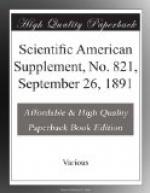Tea,—A cupful (four to five ounces) of tea or coffee, with a trifle of milk, as at breakfast; one and three-fourths ounces of bread; and exceptionally (and at most) six ounces of water.
Supper.—One to two soft boiled eggs; four or five ounces of meat; one and three fourths ounces of bread; a trifle of cheese, salad, or fruit; six to eight ounces of light wine diluted with an eighth volume of water. The quantity of beverage may be slightly augmented at each meal if necessary, especially if there is no morbid heart trouble.
Schwenninger (Bismarck’s physician), who opened a large sanitarium near Berlin a few years since for the treatment of the obese, employs Oertel’s treatment, modified in that an abundance of beverage is permitted, provided it is not indulged in at meals; it is forbidden until two hours after eating.
Both Oertel’s and Schwenninger’s methods have procured grave dyspepsias, and fatal albuminurias as well, according to Meyer and Rosenfield. It has been charged the allowance of beverage upon which Schwenninger lays so much stress in the treatment at his sanitarium has a pecuniary basis, in other words a commission upon the sale of wines.[2]
[Footnote 2: The sanitarium is owned by a stock company, Schwenninger being merely Medical Director.—ED.]
Thus, it will be observed that while some forbid beverage, others rather insist upon its employment in greater or less quantities. Under such circumstances, it would seem but rational, before undertaking to relieve obesity, to establish its exact nature, and also the role taken by fluids in the phenomena of nutrition.
Physiologists generally admit water facilitates nutritive exchanges, which is explained by the elimination of a large quantity of urine; the experiments of Genth and Robin in this direction appear conclusive.
Bischoff, Voit, and Hermann have shown that water increases, not alone the elimination of urine, but also of sodium chloride, phosphoric acid, etc. Grigoriantz observed augmentation of disintegration when the quantity of beverage exceeded forty-six to eighty ounces ("1,400 to 2,400 cubic centimeters”) per diem. Oppenheim, Fraenkel, and Debove, while believing water has but little influence upon the exchanges, admit it certainly need not diminish the latter; and Debove and Flament, after administering water in quantities varying from two to eight pints per diem, concluded that urine was diminished below the former figure, while above the latter it increased somewhat, being dependent upon the amount ingested. It was on the strength of the foregoing that Lallemand declared water to have no influence upon the exchanges.




